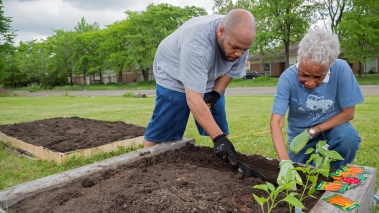National Institute for Health and Clinical Excellence (NICE)
|
|
Membership of social groups after retirement ‘boosts health and wellbeing’
New research published by the BMJ suggests that membership of social groups such as book clubs or church groups after retirement is linked with improved health and wellbeing.

The research backs NICE’s recent recommendations advising councils to do more to offer group activities to older people in order to tackle loneliness and improve wellbeing.
While many older people are active well into their retirement, figures suggest that between 5 and 16% of people over 65 say they are often or always lonely. The Mental Health Foundation also estimates that around a fifth of adults aged over 65 living in the community have depression.
In the latest study, researchers from the University of Queensland tracked the health of 424 people for 6 years after they had retired. Their health was then compared with the same number of people matched for age, sex, and health status, but who were still working.
Each participant was asked how many different organisations, clubs and societies they belonged to. They were also asked to complete a validated score to assess quality of life and subjective physical health.
The study found that membership of social groups was associated with quality of life, and that compared with those still working, every group membership lost after retirement was associated with a 10% drop in quality of life 6 years later.
If a person belonged to 2 groups before they retired, and kept them up over the next 6 years, their risk of death was 2%. But this rose to 5% if they gave up membership of 1 group, and 12% if they gave up membership of both.
The researchers also found that this impact was comparable with the benefits gained from physical exercise both before and after retirement.
Join a choir, volunteer, or help with reading in schools, says NICE
The findings support recommendations in the NICE guideline on maintaining the independence and mental wellbeing of older people.
Aimed at local authorities, commissioners, managers and practitioners, the guideline advised offering a range of group activities for older people to help them avoid loneliness, dementia and other symptoms of ill health.
Suggested activities include joining a choir, taking part in arts and crafts and participating in physical activity programmes such as walking schemes.
NICE also recommends providing intergenerational activities, such as older people helping with reading in schools, or young people providing older people with support to use new technologies.
Further recommendations include making older people aware of the value and benefits of volunteering, and activities for identifying those most at risk of a decline in their independence and wellbeing.
Commenting on the study, the researchers said that the findings can have practical implications on planning for retirement.
“They suggest that as much as practitioners may help retirees adjust by providing support with financial planning, they may also help by providing social planning,” they said.
“In this regard, practical interventions should focus on helping retirees to maintain their sense of purpose and belonging by assisting them to connect to groups and communities that are meaningful to them,” they added.
NICE guideline offers practical advice to NHS, councils and voluntary sector
Professor Gillian Leng, Deputy Chief Executive and Director of Health and Social Care at NICE, said: “While the study’s findings are observational and conclusions cannot be drawn about cause and effect, they do highlight the association between membership of social groups and health and wellbeing.
“Our guideline offers a range of practical advice on how NHS, local authorities and the voluntary sector can reduce loneliness and improve the physical and mental health of those in later life.
“Among them are group activities which can unite younger and older people, offer scope for learning, and provide opportunities to engage in creative activities.”


